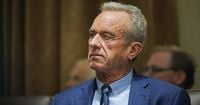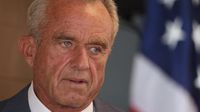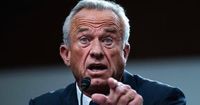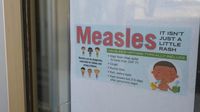The measles outbreak has now surpassed 700 reported cases in the U.S., raising the pressure on Health and Human Services Secretary Robert F. Kennedy Jr. to rein in the deadly virus. Overall, 712 cases have been reported with new cases being discovered in Kansas, Ohio, and Indiana, according to the Centers for Disease Control and Prevention (CDC). The outbreak has now spread to 25 states, per the data.
The uptick comes after Kennedy suggested earlier this week at a White House Cabinet meeting that cases were plateauing. The Lone Star State still has the highest number of outbreaks, with 514 confirmed cases. The state added 36 new cases earlier this week, according to the latest tally from Texas Department of State Health Services. Gaines County alone has reported 355 outbreaks.
Since the outbreak of measles began to spread earlier this year in Texas, at least 56 people have been hospitalized with complications from the virus. Two school-aged kids in the state have died from the infection. Both were unvaccinated and had no known underlying conditions. Kennedy visited Gaines County to comfort the family of an 8-year-old girl who died from the disease.
The HHS secretary promoted the measles, mumps, and rubella (MMR) vaccine as the "most effective" way to prevent the spread of measles. "My intention was to come down here quietly to console the families and to be with the community in their moment of grief," Kennedy, who has faced criticism for the department’s response to the outbreak and his previous stance on childhood vaccines, said earlier this month.
The number of cases in other states has also risen. The tally has increased to 58 in New Mexico, with six being reported by people who had at least one dose of the vaccine, the New Mexico Department of Health reported. One death in the state is being investigated after the deceased resident tested positive for measles. They were also unvaccinated, per the CDC.
In Kansas, the number of cases went up to 32, with half of those affected being between 5 and 17 years of age, the data from the Kansas Department of Health and Environment shows. There have been six reported cases of measles in Indiana so far, with all of them being discovered in Allen County, according to the Indiana Department of Health.
Despite facing blowback from his initial reaction to the outbreak, Kennedy has gotten some praise for saying the MMR vaccine is the "most effective way to prevent the spread" of the viral infection. "We are seeing at least some sign this administration understands they need to respond more appropriately," Jason Schwartz, a vaccine researcher at the Yale School of Public Health, told The Hill. "It’s encouraging that there was an acknowledgement of basic public health knowledge, but it reminds us of just how little we’ve heard from this administration about the benefits of vaccination," Schwartz added. "It’s noteworthy that the acknowledgement was the stuff of headlines."
The outbreak represents the first time Kennedy has had to reconcile his past as a leading critic of vaccines since taking on the leadership role and as funding cuts under the Trump administration have hit public health offices that work to track and prevent the disease.
In related news, Kennedy said that the Trump administration is considering a framework for GLP-1 medications to treat obesity. Recently, the Trump administration announced it would rescind a Biden administration proposal to expand coverage of anti-obesity medications such as Ozempic and Wegovy for Medicare and Medicaid recipients.
Currently, Medicare and most state Medicaid programs only cover these drugs for individuals diagnosed with obesity or those who are overweight and have cardiovascular disease. The Biden administration plan would have allowed Medicare and Medicaid to cover anti-obesity medications for people with obesity, even if they do not have a cardiovascular disease.
Kennedy previously spoke against these types of medications, saying there is a huge push to sell them to the public. "They’re counting on selling it to Americans because we’re so stupid and so addicted to drugs," Kennedy told Fox News’ Greg Gutfeld in October 2024.
Kennedy has somewhat softened his stance since then, but he still isn’t eager to extend coverage to individuals with obesity. "Long term, we'd like to see that those drugs available for people after they try other interventions," he told CBS News this week. "Glucose monitors, for example, which are very, very effective and only cost $80 a month and they've been shown to be extraordinarily effective in helping people lose weight and avoid diabetes," he added. "Health regimens, including particularly change in diet but also exercise."
Kennedy said if other interventions don’t work, he would be open to providing these medications. "That's what the framework that we're now that we're debating," Kennedy told CBS News.
According to the Cleveland Clinic, these drugs, known as GLP-1 inhibitors, help manage blood sugar levels by triggering insulin release from the pancreas. The drugs also help slow digestion, which causes less glucose to enter the bloodstream. Additionally, the medicine impacts satiety, allowing patients to feel full after eating, the Cleveland Clinic said. These drugs were initially prescribed to help manage Type 2 diabetes but have since gained popularity for helping patients manage weight.
However, these drugs come with a significant out-of-pocket cost. According to Good RX, a one-month supply of Wegovy costs $1,298. Due to the drugs' popularity and price, the proposal could result in a significant financial burden for taxpayers. The Congressional Budget Office estimates that such a policy would increase federal spending by $35 billion from 2026 to 2034. The Congressional Budget Office also notes that federal spending could be even higher if the drugs increase the life expectancy of Americans who would collect Social Security and Medicare later in life.
On another front, Kennedy on Thursday touted Utah’s recent ban on fluoride in public drinking water and praised the CDC for its handling of the measles outbreak. During a cabinet meeting with President Donald Trump at the White House, Kennedy quoted a National Toxicology Program study from 2024, which linked high levels of fluoride with lower IQs in children.
Kennedy said the study "shows a direct inverse correlation between exposure to fluoride and IQ loss, particularly in children," adding that he was working with Environmental Protection Agency Administrator Lee Zeldin to "reassess the fluoride rules." The study cited by Kennedy was criticized by the National Academies of Sciences, Engineering and Medicine and the American Dental Association for inadequate statistical rigor and other methodological flaws.
On Monday, Kennedy praised Utah for becoming the first state to prohibit local governments from adding fluoride to public water systems. He subsequently told the Associated Press that he will tell the CDC to stop recommending cities and states put fluoride in water to improve dental health.
The use of fluoride in the U.S. has been a successful public health initiative for reducing dental cavities and improving general oral health since 1945, according to the National Institutes of Health. Still, the agency acknowledged that there have been concerns that pregnant women and children may be exceeding safe levels of fluoride intake from a variety of sources including "treated public water, water-added foods and beverages, teas, toothpaste, floss, and mouthwash."
Kennedy has endorsed claims that fluoride is behind a host of health conditions, from ADHD and hypothyroidism to lowering IQ. However, dentists and epidemiologists have hit back at those accusations as scientifically unproven and have warned that removing fluoride from water systems could take a serious toll on public health.
As the debate around public health policies continues, Kennedy's comments and actions will likely remain under scrutiny as the nation grapples with these pressing health issues.







